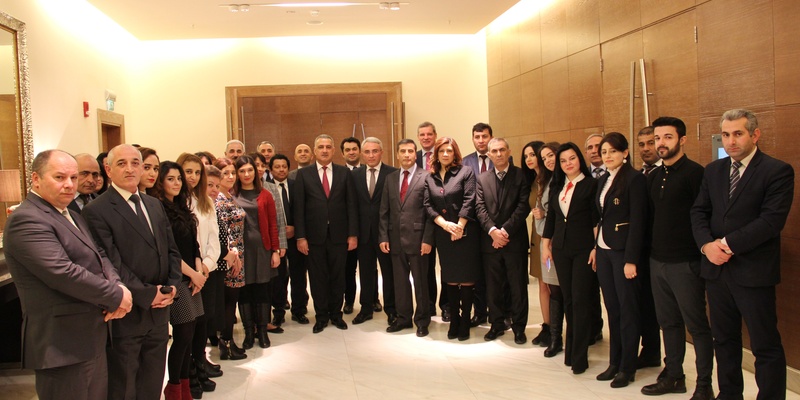Strengthening the Phytosanitary Capacities of IPPC Contracting Parties though Project Implementation
Posted on Wed, 22 Mar 2017, 07:45

Photograph Copyright: FAO AZ, 2016, Inception meeting of the MTF/AZE/007/STF: STDF/PG/316 Strengthening phytosanitary inspection and diagnostic services in Republic of Azerbaijan
The Implementation Facilitation Unit (IFU) of the Secretariat of the International Plant Protection Convention (IPPC) works to support the strengthening of phytosanitary capacities of contracting parties to implement the International Plant Protection Convention (IPPC) and its International Standards on Phytosanitary Measures. One of the means to achieve this objective is through national level implementation projects. These projects, financed by the Food and Agriculture Organization of the United Nations (FAO), the Standards and Trade Development Facility (STDF), and other donors:
-
assist countries in the application of the Phytosanitary Capacity Evaluation (PCE) tool identifying the gaps and strengths of their phytosanitary systems, and setting their phytosanitary capacity development strategy;
-
facilitate the establishment of multi-stakeholder dialogue and strengthen stakeholders capacity through their participation in meetings and workshops;
-
build partnerships and increase awareness of IPPC related issues;
-
streamline collaboration between national counterparts, donors and international institutions.
In 2016 the IFU provided technical backstopping to the implementation of seven national level projects:
Capacity building programme in support of the Palestinian National Authority - Sanitary and Phyto-Sanitary (SPS) Measures OSRO/GAZ/402/NET
The project aimed to provide technical inputs towards the development of draft phytosanitary legislation including subsidiary legislation, the development of a phytosanitary information system, training on conducting phytosanitary inspections and the establishment of a plant diagnostic laboratory.
Development of Phytosanitary legislation and capacity development strategy in South Sudan, TCP/SSD/3502
In response to a request from the Government of South Sudan, this project provided technical assistance towards the drafting of a phytosanitary legislation framework and the establishment of a national plant protection organization (NPPO). Modules of the PCE, including the module on phytosanitary legislation, were applied, the phytosanitary capacity development strategy was elaborated and two priority legal/regulatory instruments drafted, validated and submitted to the Government of South Sudan for adoption.
Nationwide Phytosanitary Capacity Evaluation (PCE) in Georgia, TCP/GEO/3601/C1
At the request of the National Food Agency of the Ministry of Agriculture of Georgia, FAO developed this project to provide technical assistance under the Technical Cooperation Programme Facility (TCP) to conduct a Phytosanitary Capacity Evaluation (PCE) in Georgia. The goal of the project is to assist in the evaluation of the Georgian phytosanitary system, analyze the phytosanitary legislation in place and outline a national phytosanitary capacity development strategy.
Strengthening phytosanitary inspection and diagnostic services in Azerbaijan, MTF /AZE/007/STF
The project seeks to improve phytosanitary inspection and diagnostic services by the State Phytosanitary Control Service and the State Customs Committee of Azerbaijan. The generous support of the FAO Sub regional office for Central Asia, has resulted in the Russian translation of the IPPC guides on export certification, import verification and phytosanitary diagnostic services (developed in English originally under the STDF/PG/350 project Global Phytosanitary Manuals, Standard Operating Procedures (SOPs) and Training Kits Project).
Support for adaptation and implementation of Integrated Pest Management in Moldova, TCP/MOL/3502
This project aims to strengthen the capacities of the Ministry of Agriculture and Food Industry and the Phytosanitary Service of the National Food Safety Agency to develop a national Integrated Pest Management programme for adoption. The IPPC Secretariat is responsible for the implementation of the phytosanitary component of the project; facilitating the application of the PCE and elaborating a phytosanitary capacity development strategic plan.
Strengthening controls of food safety threats, plant and animal pests and diseases for agricultural productivity and trade in Southern Africa, GCP/SFS/001/MUL
National Sanitary and Phytosanitary Measures (SPS) capacities are being assessed through the application of the PCE tool in Botswana and Namibia. To-date, Botswana, Madagascar, Mozambique, Namibia and Zimbabwe are in various phases of the PCE application. Countries continue to complete the Needs Assessment component of their PCEs, and have begun to develop their respective national phytosanitary strategic plans in 2017.
On top of that, the IFU dedicates time and efforts to strengthening the phytosanitary capacities of its member countries. In order to develop national phytosanitary capacities of a greater number of countries, PCE facilitators were trained to understand the content of a PCE and to conduct a PCE thanks to the STDF 401 project. Four PCE facilitators will continue their training in the field in 2017, with more to be trained in the coming year. The IPPC recognizes that the phytosanitary legislative component is of crucial importance when assisting an NPPO. For this reason, lawyers were also trained on phytosanitary legislation under the STDF 401 project, and will also be taken to the field to conduct PCEs.
The IPPC Secretariat is committed to providing technical support to contracting parties and will continue to strengthen its collaboration with well-established partners and donors. Developing new partnerships and initiatives will be critical to ensure continued improvement of phytosanitary systems amongst IPPC contracting parties.
 Photograph Copyright: 2017 IPPC, Sosa, O. Namibian and IPPC Phytosanitary experts meet in Namibia to apply the PCE
Photograph Copyright: 2017 IPPC, Sosa, O. Namibian and IPPC Phytosanitary experts meet in Namibia to apply the PCE

Photograph Copyright: 2017 IPPC, Sosa, O. PCE Workshop brainstorming and discussion in with phytosanitary experts in Botswana

